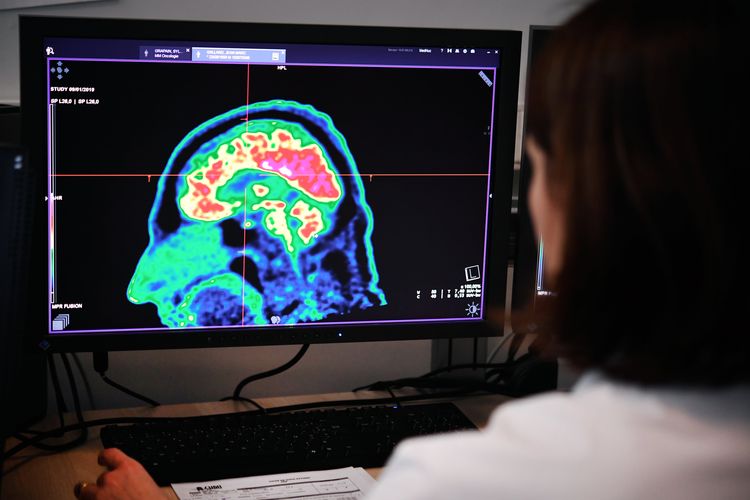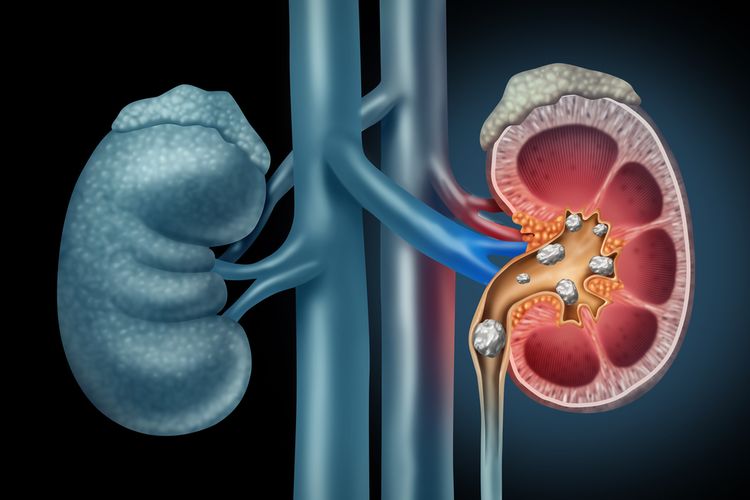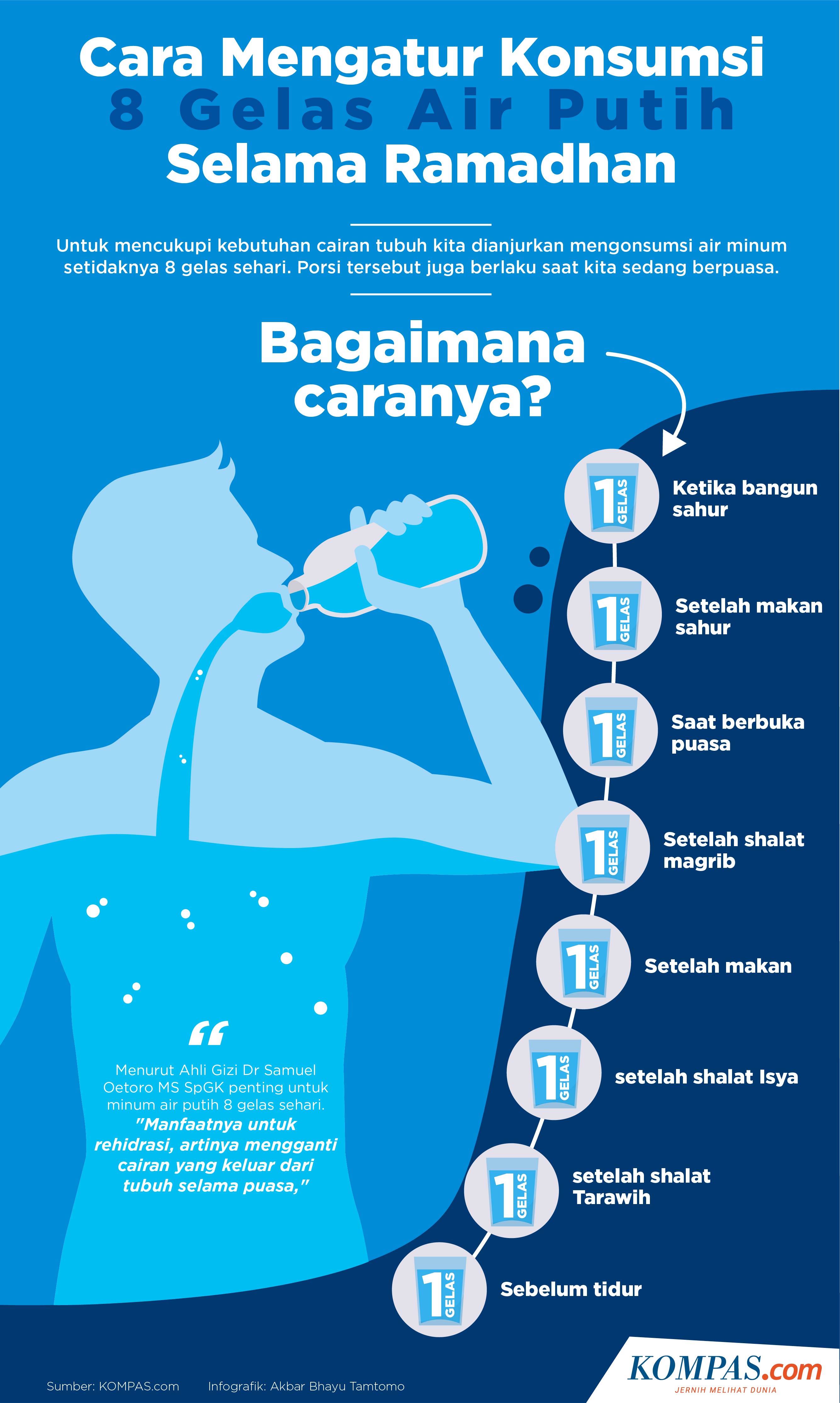7 Benefits of Drinking Water, Anything? All pages
KOMPAS.com – Drinking enough water is the most basic rule of maintaining a healthy body.
Research shows that the human body can last weeks without food, but the body can only last a few days without water.
Reporting from BBC, 19 December 2019, this is because about 60 percent of the composition of the human body consists of water.
Thus, lack of water or dehydration can affect humans both physically and mentally.
Also read: Listen, these are 15 foods to avoid for a strong immune system
Daily water needs
The UK’s National Health Service (NHS) recommends consuming a minimum of 6-8 glasses of water every day, to keep the body hydrated.
The need for water will also increase when you are doing physical activity, or when the weather is hot, which can cause loss of fluids through sweating.
The minimum amount of daily water consumption can be obtained from plain water, low-fat milk, low-sugar drinks, tea and coffee.
However, keep in mind also the added sugar contained in tea, coffee, or soft drinks. Therefore, the most recommended is drinking water.
Also read: Apart from making your skin prettier, these are the benefits of tempeh for health
Reporting from Healthline, 30 June 2020, here are 7 benefits of drinking water:
1. Helps improve physical performance
If the body lacks water, the physical performance that can be expelled will also decrease. This is especially important when doing sports or in hot weather environments.
Dehydration can have a real effect if the body loses at least 2 percent of its water reserves. However, it is not uncommon for athletes to lose 6–10 percent of their water weight through sweating.
Also read: 11 Benefits You Can Get from a Cup of Black Coffee
This can cause body temperature to change, less motivation, and increase fatigue. These factors can make exercise feel much harder, both physically and mentally.
Maintaining adequate water has been shown to prevent this from happening, and can even reduce the oxidative stress that occurs during high-intensity exercise. This is not surprising, considering that about 80 percent of the muscle composition is water.
If a person is exercising intensely and tends to sweat a lot, then keeping the body hydrated can help to bring out optimal performance.
Also read: 130 Doctors Died from Covid-19, Most General Practitioners
2. Maintain brain function and mood
 An image of a human brain taken by a positron emission tomography scan, also called a PET scan, is seen on a screen on January 9, 2019, at the Regional Hospital Center and University of Brest (CRHU – Center for the Hospitalier Régional et Universitaire de Brest), western France. CHRU from Brest recently acquired a new molecular imaging tool, the most advanced in France at present according to the hospital center, which is capable of detecting deep lesions and especially cancer pathologies, the hospital said on January 9, 2019.
An image of a human brain taken by a positron emission tomography scan, also called a PET scan, is seen on a screen on January 9, 2019, at the Regional Hospital Center and University of Brest (CRHU – Center for the Hospitalier Régional et Universitaire de Brest), western France. CHRU from Brest recently acquired a new molecular imaging tool, the most advanced in France at present according to the hospital center, which is capable of detecting deep lesions and especially cancer pathologies, the hospital said on January 9, 2019.Brain function is greatly influenced by the adequacy of water in the body.
Research shows that mild dehydration, such as a loss of 1-3 percent of water from body weight, can damage many aspects of brain function.
In a study of young women, researchers found that a 1.4 percent loss of fluids after exercise disrupted mood and concentration.
It also increases the frequency of headaches.
Also read: Frequent Migraines? Recognize Symptoms and How to Overcome Them
Many members of the same research team conducted similar studies on young men.
They found that a 1.6 percent loss of fluids damaged memory and increased feelings of anxiety and fatigue.
A 1–3 percent fluid loss equals about 0.5–2 kg of weight loss, for a person weighing 68 kg.
This can easily occur through normal daily activities, especially during exercise or high heat.
Many other studies, with subjects ranging from children to older adults, have shown that mild dehydration can interfere with mood, memory, and brain performance.
Also read: A series of regional heads in Indonesia who are positive for Covid-19
3. Prevent headaches
Dehydration can trigger headaches and migraines in some people.
Research has shown that headaches are one of the most common symptoms of dehydration.
For example, a study conducted on 393 people, found that 40 percent of participants experienced headaches due to dehydration.
Meanwhile, other studies suggest that drinking water can help reduce headaches and headache symptoms.
However, more research is needed to confirm these benefits.
Also read: Viral Headache Medication To Boil and Make Meat Soft, What’s the Harm?
4. Relieves constipation
Constipation is a common health problem characterized by infrequent bowel movements and difficulty defecating.
Increasing fluid intake is often recommended as part of treatment, and there is some evidence to support this.
Low water consumption appears to be a risk factor for constipation in both younger and older people.
Also read: NASA Reveals Discovery of Water on the Surface of the Moon, What Does It Mean?
Increasing hydration can help reduce constipation.
Mineral water can be a very beneficial drink for those who experience constipation.
Research has shown that mineral water rich in magnesium and sodium increases the frequency and consistency of bowel movements in people with constipation.
Also read: 9 Effects of Stress on Body Health, from Causing Heart Disease to Damaging Sex Life
5. Helps treat kidney stones
 kidney stone illustration
kidney stone illustrationKidney stones are painful clumps of mineral crystals that form in the urinary system.
There is certain evidence that water intake can help prevent recurrence in people who have previously had kidney stones.
Higher fluid intake increases the volume of urine that passes through the kidneys.
Adequate water intake can help dilute mineral concentrations, making them less likely to crystallize and form lumps.
Water can also help prevent early stone formation, but more research is needed to be sure.
Also read: Melting Ice in Greenland and Annual Flood Risk …
6. Reduce hangover
Hangover refers to the uncomfortable symptoms experienced after drinking alcohol.
Alcohol is a diuretic, so it makes your body lose more water than you consume.
This can lead to dehydration.
Although dehydration is not the main cause hangover, it can cause symptoms such as thirst, fatigue, headaches, and dry mouth.
Good way to cut back hangover is to drink a glass of water in between drinking alcohol and drink at least one large glass of water before bed.
Also read: The results of positive viral cat autopsy fed by Ciu, this is the danger of alcohol in animals
7. Helps you lose weight
Drinking lots of water can help you lose weight.
This is because water can increase satiety and increase the body’s metabolic rate.
Some evidence suggests that increasing water intake can promote weight loss by slightly increasing metabolism, which can increase the number of calories burned each day.
Also read: Listen, These are 3 Steps to Lose Weight Fast
A 2013 study of 50 young, overweight women showed that drinking an additional 500 mL of water 3 times a day before meals for 8 weeks led to significant weight loss and body fat loss.
Time to drink water is also important.
Drinking water half an hour before meals is the most effective, because it makes the body feel fuller so that it eats fewer calories.
In one study, dieters who drank 0.5 liters of water before eating lost 44 percent more body weight over 12 weeks than dieters who didn’t drink water before eating.
Also read: Get to know what Bulimia is, Vicky Shu’s serious eating disorder

Infographic: How To Manage The Consumption Of 8 Glasses Of Water During Ramadan